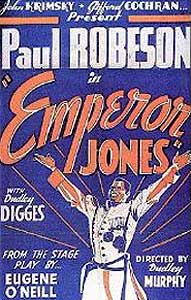 The 1933 film adaptation of Eugene O'Neill's well-intended 1920 play The Emperor Jones was filtered through the screenwriting sensibilities of Dubose Heyward, author of the 1925 novel Porgy. Paul Robeson would later repudiate the screenplay because he would rather have stuck to the play itself, in which he had starred in 1925.
The 1933 film adaptation of Eugene O'Neill's well-intended 1920 play The Emperor Jones was filtered through the screenwriting sensibilities of Dubose Heyward, author of the 1925 novel Porgy. Paul Robeson would later repudiate the screenplay because he would rather have stuck to the play itself, in which he had starred in 1925.
In 1933 he did not object. But from a position of hindsight Robeson felt Heyward changed the play too much. The film was immediately condemned by the United Negro Improvement Association, encouraging Robeson's desire for excuses.
The fact is, though, either version has "problematical" content bound to distress activists who would never approve of this strictly white attempt at capturing, in a fabular context, the black experience.
It is true Dubose mutilated the play by doing away with the flashbacks, adding scenes that provided for tapdancing (by a very young uncredited Harold Nicholson) & singing (by Robeson of course), & by doing away with any attempt at psychological complexity in favor of a character who goes from good to appallingly bad in three easy lessons.
Even so, it was like carving up a turkey that had already putrified. It wasn't like Hayward really ruined something that O'Neill had gotten exactly right.
As well meaning as O'Neill & even Heyward may have been, they could not seriously understand black sensibilities of the 1920s or 1930s, much though they believed they could. They tackled risky material that even a genius of the Harlem Renaissance might've had trouble getting right, & as it stood, it wasn't done well.
It's hard to tell what liberal "good" the white writers had in mind, other than a serious but failed desire to create art. But they were surprised by African American distress. In outline & in final execution both play & film rely so wholly on contemporary black stereotyping it can't be that anyone thought they were avoiding said stereotypes.
Rather, it seems as though the writers were attempting to invest these stereotypes with humanity, predominantly human folly. Alas, this is a bit like wanting to make a film about a great African American chef who works chiefly with watermelons, plays craps in his spare time, & funds his four-star restaurant by pimping teenage girls, fine choices cuz hey, he's a great chef.
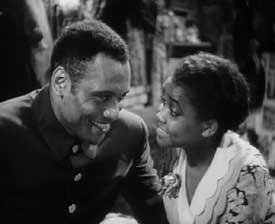 The absurd plot requires the wildest improbabilities to keep the story bounding down a slope of lunacy. Rufus Jones starts out as a good & loving man -- as long as he's isolated in a small black rural town & attending church each day. The absurd plot requires the wildest improbabilities to keep the story bounding down a slope of lunacy. Rufus Jones starts out as a good & loving man -- as long as he's isolated in a small black rural town & attending church each day.
His beloved Undine is played well by Fredi Washington, who was forced to perform in blackface because her skin color was so pale the producers feared people would think Paul Robeson was with a white woman.
When he gets a job as a porter on a train that connects him to the life of gamblers & pimps & prostitutes & jazz in Harlem, he is by swift stages corrupted into a womanizer, then a murderer, thus a beefcake member of a chain gang singing worksongs while busting rocks.
This is an old theme in white stories about black people, & sometimes by black people about themselves. At its worst, the message is that Jazz & urban life excites the Devil, but if everyone had stayed in the rural South slaving in the cottonfields, that'd be right pleasing to de Lawd. Neither Heyward nor Dubois seem ever to have asked themselves if the Harlem Renaissance mightn't in fact be a higher good than uneducated rural poverty making far fewer demands for equity.
After Paul sings a nice song he right away kills a guard then escapes by having a lot of enormous rocks dumped on him in the bed of a truck. Powerful guy like that wasn't gonna be killed by three tons of granite landing on his head after all.
Fleeing America, he becomes a stevedore sweating in the bowels of a ship. This provided for a nice 'nother chance at beefcake, & hey, he does have the Mandango bod.
He abandons ship to swim to a Carribean island ruled by a corrupt "bush nigger" whom Rufus the charismatic killer overthrows, becoming thereby the Emperor Jones in an ridiculous jungle-dufus military uniform, using his absolute power to be absolutely tyranical.
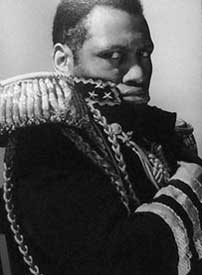 It seemed to me the only way to redeem this repugnant plot would itself be a Hollywood cliche, but a redeeming cliche, in that Rufus learns at last that his original moral self had been someone worth being, but this "successful" man who became wealthy & powerful is an awful thing to be. It seemed to me the only way to redeem this repugnant plot would itself be a Hollywood cliche, but a redeeming cliche, in that Rufus learns at last that his original moral self had been someone worth being, but this "successful" man who became wealthy & powerful is an awful thing to be.
That wouldn't've made it a good film but the attempt at moral structure would at least make the demeaning bits comprehensible as to "why" the author(s) thought a story this foolish represented something useful or true about black America.
But no, Rufus merely gets his come-uppance, learning nothing by his experience. He is not capable of growing or learning, & any regret he feels is only due to fear, not conscience.
Any higher meaning of it all is very hard to fathom though there's certainly nothing subtle about the story's manner & method. The ideas for the character are redacted from the history of Henri Christophe (1767-1820), who escaped slavery & became a dictator in Haiti.
King Henri faked his own nobility & abused his power, a lot like the Emperor Jones, & like Jones he kept a silver bullet handy in case things went awry.
No other specifics of Henri Christophe's rise make it into the play or film, however. It might've been a better story if it had decided to look at that history directly rather than disguise it in a fairy tale of a Harlem sinner striving preposterously to be a story apropos of African American experience.
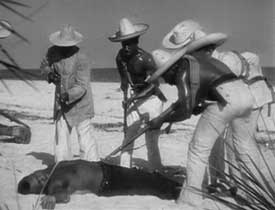 Now this has sounded like a very negative review, by way of understanding why it would offend middle class blacks of the era. Average black filmgoers didn't hate it quite so much, & some scenes got loud glad responses from black audiences. As for example when Rufus is sold into slavery but soon turns the tables on his would-be white master & becomes himself the master.
Now this has sounded like a very negative review, by way of understanding why it would offend middle class blacks of the era. Average black filmgoers didn't hate it quite so much, & some scenes got loud glad responses from black audiences. As for example when Rufus is sold into slavery but soon turns the tables on his would-be white master & becomes himself the master.
When Jones wraps his hands around the throat of Smithers (Dudley Digges), it was revolutionary to show on the screen a white man under the hand of a black man. And the more so because whatever punishment Rufus ultimately experiences for his sundry betrayals, crimes, & cruelties, he remains throughout superior to Smithers. And it was thrilling if not really empowering to see the white man unmanned & helpless whether under Rufus's smile & gaze or in his tightening hands.
Fact is, Robeson's real-life personality was so big that he filled up this ludicrous role & burst its seams & lent Rufus the very humanity O'Neill may have been dreaming he invested in the play but which was strictly Robeson, who smuggled great moments into this awful role.
For instance, his extended come-uppance when chased around by voodoo spirits in the jungle of the island kingdom, I loved that crap, the same way I've enjoyed lots of awful jungle adventures.
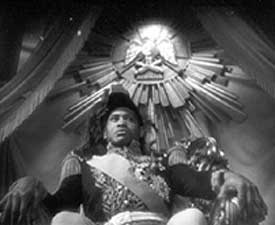 Robeson puts on quite a one-man-show while lost in the nighted jungle, going through every emotion when confronted by "haints" from his corrupt life, terrorized by the hoodoo & drumming of those "bush niggers" he despised. Robeson puts on quite a one-man-show while lost in the nighted jungle, going through every emotion when confronted by "haints" from his corrupt life, terrorized by the hoodoo & drumming of those "bush niggers" he despised.
I enjoyed the whole film because Robeson scene for scene made it spectacularly cool, irregardless of its objective foolishness. I love horror films, I love fantasy films, & it is a marvel to see a physical & emotional presence like that of Paul Robeson performing in a cheesy genre with jungle magic & ghosts in a fantasy empire.
So this is a damned good movie in its off-the-wall nutty manner, & the vast derogatory context is completely defeated by Robeson's greatness.
I must also say that use of the word "nigger" though hardly required struck me as the least awful thing about the film. I'm not offended by this harsh word when it is used in modern rap poetry, nor does it alarm me in Emperor Jones.
I understand why it was so difficult especially for middleclass black America to hear Rufus speak of those "black apes" & "bush niggers." But if it may be said that good art is confrontational, then it must be admitted that bad art trying to be good will be confrontational too.
It is the film's larger context's failure that is tragic, not its ability to offend, with one word. The same bleeding heart whites & middleclass blacks who deplore even the youth culture of their own sons' & daughters' rap poetry will of course criticize the word alone.
But it is too bad that the most positive thing one can say about this film is it's one hell of an oddball jungle picture, not more racist than most such, but a lot more original than any other jungle pics of the era, with a mightily impressive actor center stage throughout.
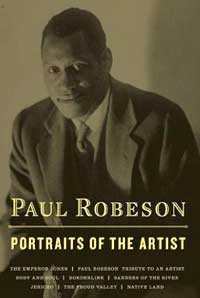 The Criterion dvd edition includes a couple significant extras. I would recommend going ahead & watching them first if this is your first exposure to Emperor Jones, as it helps to get past the offensiveness of many aspects of the story if the entire context for the role & Robeson's embracing of that role are fully understood beforehand.
The Criterion dvd edition includes a couple significant extras. I would recommend going ahead & watching them first if this is your first exposure to Emperor Jones, as it helps to get past the offensiveness of many aspects of the story if the entire context for the role & Robeson's embracing of that role are fully understood beforehand.
Our Paul: Remembering Paul Robeson (2007) was made for the Criterion edition, a 45-minute overview of his life & work, highlighted by interviews with Ruby Dee & James Earl Jones, who knew Robeson & are of an age to remember the initial reception & significance of Paul's first starring role.
There's a less interesting but still quite nice short interview with Paul Robeson, Jr. And there's a commentary track by historian Jeffrey C. Stewart who starts out very interesting.
The commentary track is, however, so redundantly talking about politics that his P.C. views of the film become tiresome after a while, like a stuffy old professor ruining love of literature by reducing it to academics. Even so it's better than nine-tenths of the commentary tracks that proliferate on all sorts of films & are so rarely worth listening to.
The best extra is Paul Robeson: A Tribute to an Artist (1979) narrated by Sidney Poitier. Although synoptic, it squeezes in a lot about Robeson's life & times.
There's considerable focus on his activism, the government persecution that interupted his career & forced him into one of the key free speech cases of the century. This documentary helps us understand him as a great man, a thinking man, albeit a great man with some naive beliefs about communism. A recipient of an Oscar for best documentary, its inclusion adds a great deal to this disc's importance.
copyright © by Paghat the Ratgirl
|
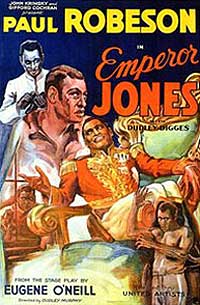


 It seemed to me the only way to redeem this repugnant plot would itself be a Hollywood cliche, but a redeeming cliche, in that Rufus learns at last that his original moral self had been someone worth being, but this "successful" man who became wealthy & powerful is an awful thing to be.
It seemed to me the only way to redeem this repugnant plot would itself be a Hollywood cliche, but a redeeming cliche, in that Rufus learns at last that his original moral self had been someone worth being, but this "successful" man who became wealthy & powerful is an awful thing to be.
 Robeson puts on quite a one-man-show while lost in the nighted jungle, going through every emotion when confronted by "haints" from his corrupt life, terrorized by the hoodoo & drumming of those "bush niggers" he despised.
Robeson puts on quite a one-man-show while lost in the nighted jungle, going through every emotion when confronted by "haints" from his corrupt life, terrorized by the hoodoo & drumming of those "bush niggers" he despised.